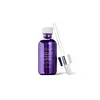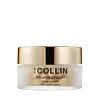What's inside
What's inside
 Key Ingredients
Key Ingredients

 Benefits
Benefits

 Concerns
Concerns

 Ingredients Side-by-side
Ingredients Side-by-side

Dimethicone
EmollientCyclopentasiloxane
EmollientCaprylyl Methicone
Skin ConditioningDimethiconol
EmollientDimethicone Crosspolymer
Emulsion StabilisingTetrahexyldecyl Ascorbate
AntioxidantDimethicone/Vinyl Dimethicone Crosspolymer
Skin ConditioningPaphiopedilum Maudiae Flower Extract
Skin ConditioningHydroxypinacolone Retinoate
Skin ConditioningBisabolol
MaskingZingiber Officinale Root Extract
MaskingCaprylic/Capric Triglyceride
MaskingDimethyl Isosorbide
SolventEthylhexyl Cocoate
EmollientGlyceryl Linoleate
EmollientGlyceryl Linolenate
EmollientTocopheryl Acetate
AntioxidantCholesterol
EmollientCeramide NP
Skin ConditioningPhenoxyethanol
PreservativeDimethicone, Cyclopentasiloxane, Caprylyl Methicone, Dimethiconol, Dimethicone Crosspolymer, Tetrahexyldecyl Ascorbate, Dimethicone/Vinyl Dimethicone Crosspolymer, Paphiopedilum Maudiae Flower Extract, Hydroxypinacolone Retinoate, Bisabolol, Zingiber Officinale Root Extract, Caprylic/Capric Triglyceride, Dimethyl Isosorbide, Ethylhexyl Cocoate, Glyceryl Linoleate, Glyceryl Linolenate, Tocopheryl Acetate, Cholesterol, Ceramide NP, Phenoxyethanol
Caprylyl Methicone
Skin ConditioningCaprylic/Capric Triglyceride
MaskingDimethicone
EmollientC15-19 Alkane
SolventPEG-12 Dimethicone/PPG-20 Crosspolymer
Olea Europaea Oil Unsaponifiables
Skin ConditioningDimethiconol
EmollientTriticum Vulgare Germ Oil Unsaponifiables
EmollientGlycine Soja Oil Unsaponifiables
EmollientLupinus Albus Seed Oil
Skin ConditioningIsodecyl Salicylate
Skin ConditioningPollen Extract
EmollientCeramide NP
Skin ConditioningTocopherol
AntioxidantParfum
MaskingBenzyl Salicylate
PerfumingCaprylyl Methicone, Caprylic/Capric Triglyceride, Dimethicone, C15-19 Alkane, PEG-12 Dimethicone/PPG-20 Crosspolymer, Olea Europaea Oil Unsaponifiables, Dimethiconol, Triticum Vulgare Germ Oil Unsaponifiables, Glycine Soja Oil Unsaponifiables, Lupinus Albus Seed Oil, Isodecyl Salicylate, Pollen Extract, Ceramide NP, Tocopherol, Parfum, Benzyl Salicylate
Ingredients Explained
These ingredients are found in both products.
Ingredients higher up in an ingredient list are typically present in a larger amount.
This ingredient is an emollient, solvent, and texture enhancer. It is considered a skin-softener by helping the skin prevent moisture loss.
It helps thicken a product's formula and makes it easier to spread by dissolving clumping compounds.
Caprylic Triglyceride is made by combining glycerin with coconut oil, forming a clear liquid.
While there is an assumption Caprylic Triglyceride can clog pores due to it being derived from coconut oil, there is no research supporting this.
Learn more about Caprylic/Capric TriglycerideCaprylyl Methicone is a type of silicone.
It helps soften and soothe the skin by creating a thin film on top. This film helps trap moisture, keeping your skin hydrated.
Ceramide NP is a type of ceramide.
Ceramides are intercellular lipids naturally found in our skin that bonds dead skin cells together to create a barrier. They are known for their ability to hold water and thus are a great ingredient for dry skin.
Ceramides are an important building block for our skin barrier. A stronger barrier helps the skin look more firm and hydrated. By bolstering the skin ceramides act as a barrier against irritating ingredients. This can help with inflammation as well.
If you would like to eat ceramides, sweet potatoes contain a small amount.
Read more about other common types of ceramides here:
Ceramide AP
Ceramide EOP
Dimethicone is a type of synthetic silicone created from natural materials such as quartz.
What it does:
Dimethicone comes in different viscosities:
Depending on the viscosity, dimethicone has different properties.
Ingredients lists don't always show which type is used, so we recommend reaching out to the brand if you have questions about the viscosity.
This ingredient is unlikely to cause irritation because it does not get absorbed into skin. However, people with silicone allergies should be careful about using this ingredient.
Note: Dimethicone may contribute to pilling. This is because it is not oil or water soluble, so pilling may occur when layered with products. When mixed with heavy oils in a formula, the outcome is also quite greasy.
Learn more about DimethiconeDimethiconol is a silicone that resembles the popular dimethicone. Like other silicones, it is an emollient. Emollients create a thin film on skin to prevent moisture from escaping.
This ingredient helps to create a silky texture and improve spreadability. Due to its high molecular weight and thickness, it is often combined with cyclopentasiloxane.